Text
Rehab Centre in Gurgaon for Drug Psychosis
Toxic psychosis, alcohol-induced psychosis, and drug-induced psychosis are all diagnostic terms for a mental health illness in which a person suffers hallucinations, delusions, or both within a month of using or withdrawing from prescription medicines, illegal drugs, and/or alcohol.
According to the Diagnostic and Statistical Manual (DSM-5), drug-induced psychosis affects 7% to 25% of individuals treated for their first psychotic episode.
If you or a loved one is suffering from the symptoms of a substance/medication-induced psychotic condition, there are various treatment options and services available to help.
SYMPTOMS
Delusions, hallucinations, or both are common symptoms of drug-induced psychotic illness. Individuals who are experiencing these symptoms may or may not be aware of whether their hallucinations and/or delusions are real.
Delusions
Delusions are false beliefs or thoughts that are not founded on reality.
The following are examples of delusions:
Persecutory: Feelings that others are trying to get you or are spying on you, even organizations.
Grandiose: Belief in yourself as being outstanding, unique, gifted, and superior to others.
Referential: Belief that people and their surroundings have hidden meanings that are meant to communicate with you.
Erotomanic: Belief in the existence of someone or numerous persons who are in love with you despite evidence to the contrary.
Nihilism: Beliefs that a tragedy will occur.
Somatic: Belief that there is a problem with your body.
“My old firm is monitoring my every move and is trying to get me,” for example, is a persecutory delusion. An erotomanic illusion could be, for example, “Aishwariya Rai is in love with me”.
Hallucinations
A hallucination is when you have an out-of-body experience with one or more senses that isn’t founded on reality.
The following are examples of hallucinations:
Auditory: Hearing voices or sounds that aren’t actually there.
Visual: Perceiving things that aren’t actually present
Olfactory: The ability to detect scents that no one else can.
Tactile: Having the sensation of being touched even when no one or nothing is touching you.
Gustatory: Tasting something even when you don’t have anything in your mouth.
In an auditory hallucination, for example, a person may hear a voice instructing them to flee or telling them that they are being followed. A visual hallucination occurs when a person sees someone, who isn’t actually there, following them.
CAUSES
A large percentage of people with a substance use disorder also have a co-occurring mental health disorder. While chemicals may not cause drug-induced psychosis directly, certain substances can trigger psychosis in people who are predisposed to it.
Risk factors for drug-induced psychotic disorder owing to cannabis, opiates, stimulants, or numerous substances were identified in a longitudinal study of persons who presented with drug-induced psychosis, these were:
Being a man
Being under the age of 30
Having a mental health problem that isn’t being addressed
Not only were these people at risk for substance-induced psychosis, but they were also more likely to acquire schizophrenia in the coming years.
Psychoactive Substances:
Drug-induced psychosis can be caused by a wide range of psychoactive drugs, including:
Alcohol
Cannabis
Phencyclidine (PCP)
Hallucinogens
Inhalants
Sedatives
Hypnotics
Amphetamines
Stimulants
DIAGNOSIS
Symptoms must have a considerable influence on your quality of life in order to be diagnosed with drug-induced psychosis. Tulasi Healthcare is a rehab centre in Gurgaon for drug psychosis.
While distinguishing drug-induced psychosis from the schizophrenia spectrum and other psychotic disorders might be challenging, there are a few crucial variables to consider.
With psychosis brought on by drugs or alcohol:
Symptoms appear within a month of using or detoxing from drugs, alcohol, or both.
Prior to the substance use or withdrawal, there are no signs or symptoms of psychosis.
Symptoms usually last less than a month.
Withdrawal symptoms normally fade after a while.
Individuals don’t experience disorganized speech or behavior, as well as decreased emotional expressiveness, which are common symptoms among people with schizophrenia spectrum and other psychotic diseases.
Onset during intoxication:
Symptoms of drug-induced psychosis might appear as soon as a substance is consumed.
When diagnosing someone, the treating physician or mental health professional will look to see if the symptoms started while the substance was still in their system. An onset during intoxication is a term used to describe such a situation.
Onset during withdrawal:
During withdrawal, one may have symptoms of drug-induced psychosis.
The treating doctor will keep track of how long the symptoms last to make sure no other mental health issues are present.
If the symptoms persist for more than a month after the substance has been removed from the system, they may ask for more information to determine if another mental health disease, such as drug-induced mood disorder, is a better fit for the symptoms.
TREATMENT
Treatment for drug-induced psychosis varies based on the patient and their specific needs. Stopping the triggering substance and closely monitoring the patient in a safe setting may be sufficient in many circumstances. Different substances, like in alcohol, may necessitate more severe treatment.
While it’s necessary to get the substance out of the person’s system (acute), it’s also critical to address any underlying mental health issues (long-term). Combining acute and long-term care might sometimes prevent a person from developing drug-induced psychosis in the future.
Medication
Medications can be used to alleviate the symptoms of drug-induced psychosis and to assist the person’s mood to normalize.
Psychotherapy
To lessen the odds of having drug-induced psychosis again in the long run, it’s critical to treat any underlying mental health disorders.
Among the treatment options available are:
Cognitive Behavioral Therapy (CBT)
Inpatient treatment for drug and/or alcohol abuse is available.
Outpatient treatment for drug and/or alcohol abuse is available.
Eye Movement Desensitization and Reprocessing (EMDR)
Dialectical Behavior Therapy (DBT)
Group Therapy
Alcohol-Induced Psychosis Considerations
When compared to other substances and treatments, alcohol withdrawal may necessitate greater monitoring. The individual may have delirium tremens (DTs), symptoms of alcohol-induced psychosis, and bodily function failure in severe cases, which can be deadly.
Treatment and care options may include:
Tests and monitoring.
Vitals stabilization, electrolyte and vitamin replenishment, and liver disease testing
If necessary, sedation with medication
Suicide assessment and monitoring
Beginning inpatient or outpatient treatment once withdrawal is complete and the patient has stabilized can be extremely beneficial. In addition to counseling, support groups may be effective.
COPING
It’s critical to emphasize self-care if you or a loved one is experiencing symptoms of substance/medication-induced psychosis.
Aside from getting professional help, you can also:
Begin to practise mindfulness to help you cope with stress.
Ground yourself by using breathing exercises.
Look for indicators of caregiver exhaustion and take some time to relax.
Talk to someone you trust about what you’re going through.
Read up on the latest research on drug-induced psychosis.
A Word from Tulasi Healthcare rehab centre in gurgaon
Although experiencing symptoms of psychosis can be terrifying, keep in mind that they may be directly related to a substance or medication that can be addressed. If you or a loved one is suffering symptoms of psychosis, contact a medical expert right away so you can get the help you need.
0 notes
Text
Best Rehab Centre in Gurgaon
Tulasi Healthcare is a group of psychiatric hospital & rehabilitation centres in gurgaon providing treatment for people suffering from addiction and mental illness.
Tulasi Healthcare has been serving people for over two decades. Having 3 centres across the NCR region. Tulasi is a pioneer in the field of mental health.
Treatment process here follow holistic approach. Treatment approach here follow evidence based technique. A team of 7 psychiatrists & more than 25 psychologist is present here round the clock.
If you are looking for a rehabilitation centre for psychiatric illness in gurgaon you can contact us on +91-8800000255.
0 notes
Text
Alcohol rehabilitation center in gurgaon
Tulasi Healthcare is an Alcohol Rehab Center in Gurgaon. The cutting edge hospital with a limit of 125 beds was initiated in November 2020. The group of Hospital & the rehab centers consist of mental experts, clinical and paramedical staff which makes it one of the most outstanding Alcohol Rehab Center in Gurgaon.
Day to day Group Therapy and individual meetings with experienced psychologists assist the individual with recovery & relapse prevention. Identification of the relapse triggers helps in dealing with relapse prevention. These triggers are important for the treatment cycle.
The team of psychologists & psychiatrists at the Alcohol Rehab Center in Gurgaon assist the patient with any withdrawals symptoms either with mental or physical difficulties (liver, kidney, Psychosis, and so forth).They help the patients emerge from their sickness. The team gives an individualized care & medicine plan which is adhered consistently.
Day to day Alcoholics Anonymous gathering are held so to furnish the individual with a strong care group, in this manner expanding the possibilities of long haul restraint and liquor free life.
The liquor therapy clinic in Gurgaon has an indoor Stadium with the facilities of chess, billiards and table tennis, badminton court, basketball court. We have employed a yoga educator and a games teacher.
0 notes
Text
Alcohol Rehab Centre in Gurgaon
Tulasi Healthcare is an Alcohol Rehab Center in Gurgaon. The cutting edge office with a limit of 125 beds was initiated in November 2020. The cutting edge foundation and nonstop group of master emotional well-being experts, clinical and paramedical staff make it one of the most outstanding Alcohol Rehab Center in Gurgaon.
Day to day Group Therapy and individual meetings with experienced clinicians assist an individual with recognizing pain points and how to manage them. Knowledge age sound survival strategies, trigger recognizable proof and backslide counteraction are all essential for the treatment cycle.
The master specialists at the Alcohol Rehab Center in Gurgaon assist the patient arrangement with any withdrawals or physical and mental complexities (liver, kidney Psychosis, and so on) that could emerge from their sickness. They give an individualized prescription arrangement which is observed consistently.
Day to day Alcoholics Anonymous gathering meetings are held so to give the individual a strong care group, in this manner expanding the possibilities of long haul moderation and liquor free life.
The liquor rehabilitation clinic in gurgaon has an Indoor Stadium, rec center, pool, billiards and table tennis tables, a yoga educator, and a games teacher. We put stock in giving comprehensive treatment to our patients.
0 notes
Text
Drug rehab center in gurgaon
Tulasi Healthcare is a group of psychiatric hospital and rehabilitation center in gurgaon. providing treatment for people suffering from addiction.
drug rehab center in gurgaon
0 notes
Text
Clinical Psychology Internship
Tulasi healthcare provides clinical psychology internship program for up to psychology students from around the globe who are passionate about mental health and want to bring change in the mental health space.
Tulasi Home mental health fellowship program is an invaluable addition to the resume. This program skilled the learner for overall professional growth in the carrier.
0 notes
Text
Addiction
Addiction
The word "addiction" comes from a Latin term that means "enslaved by" or "tied to." When academics initially started looking at what caused addictive behavior in the 1930s, they assumed that persons who developed addictions were morally wrong or lacked willpower. They believed that overcoming addiction entailed either punishing offenders or encouraging them to summon the willpower to abandon a habit.
Addiction is now recognised as a chronic disease that affects both the structure and function of the brain. Addiction hijacks the brain in the same way that cardiovascular disease harms the heart and diabetes harms the pancreas. Addiction recovery necessitates willpower, but it's not enough to "simply say no." Multiple strategies, such as counseling, medication, and lifestyle changes, are required instead.
Most experts now distinguish between two types of addiction:
● Chemical addiction: Addiction to chemicals such as alcohol, cigarettes, cannabis, opiates, cocaine, sedatives, stimulants, hallucinogens, and volatile solvents.
● Behavioral addiction: Addiction characterized by compulsive activities. These are persistent, recurrent actions that you engage in despite the fact that they provide no genuine advantage. The following are examples of behavioural addictions: Social Media Addiction, Gaming Addiction, Gambling Addiction, Compulsive Buying / Oniomania, Sexual Addiction, Exercise Addiction, and Tanning Addiction are some of the most common types of addiction.
How addiction operates in general:
The principle of pleasure:
Whether the pleasure comes from a psychoactive drug, a monetary reward, a sexual encounter, or a fulfilling meal, the brain registers all pleasures in the same way. Any positive pleasure stimulation in the brain induces a release of dopamine neurotransmitter in the nucleus accumbens, a collection of nerve cells beneath the cerebral cortex. By flooding the nucleus accumbens with dopamine, addictive drugs and behaviors create a shortcut to the brain's reward system.
The speed with which a drug or engaging in a rewarding activity boosts dopamine release, the intensity of that release, and the consistency of that release are all factors that influence the chance of addiction. Even varied ways of administering the same medicine can have an impact on how likely it is to lead to addiction. Smoking or injecting a drug intravenously, rather than ingesting it as a pill, provides a faster, stronger dopamine signal and is more likely to lead to drug abuse.
Cravings and tolerance:
The desire to repeat this bliss can lead to cravings for the substance or behavior, especially if you are exposed to the same cues repeatedly (like a party where people are drinking, for example). Cravings are sometimes the first indicator of addiction. Your brain continues to manufacture more dopamine as you continue to use a substance or engage in a behavior. It eventually realizes that your brain already has plenty of dopamine and begins creating less in response to regular triggers.
When a person becomes addicted, their brain receptors are overloaded by an overabundance of Dopamine. When noise becomes excessively loud, the brain responds by creating less dopamine or deleting dopamine receptors, which is similar to dialing down the volume on a loudspeaker.
Dopamine has less of an impact on the reward region of the brain as a result of these adjustments. People who acquire an addiction generally discover that the desired substance no longer provides them with the same level of pleasure over time. Because their brains have adapted, they must take more of it to achieve the same dopamine "high." This is known as tolerance.
The learning procedure:
Dopamine is involved in not only the sensation of pleasure, but also in learning and memory, two important aspects of the journey from appreciating something to becoming addicted to it. Dopamine combines with glutamate, another neurotransmitter, to take over the brain's reward-related learning system. The pleasure associated with an addictive drug or behavior fades, but the memory of the intended result, as well as the desire to repeat it (wanting), remains. Compulsion takes hold at this point.
The hippocampus and amygdala store knowledge about environmental cues connected with the sought chemical in order to locate it later. When the person is exposed to those environmental cues, these memories contribute to build a conditioned response-intense yearning.
How to tell whether someone has a substance abuse problem:
Substance use disorder (SUD) is a complicated condition in which a person uses a substance without thinking about the consequences. People with SUD have a strong desire to use a certain substance(s), such as alcohol, tobacco, or illegal drugs, to the point where their ability to function in daily life is harmed. People continue to consume the substance while knowing that it is creating or may cause issues.
There are only a few factors for determining whether or not someone has a substance use disorder:
The substance is frequently consumed in larger quantities or for longer periods of time than was planned.
There is a persistent desire, or an unsuccessful attempt, to reduce or restrict the substance's use.
A significant amount of time is spent on activities that are required to obtain, consume, or recuperate from the effects of the substance.
Craving arises when a person has a strong desire or wants to take the material.
Repeated use of the substance causes failure to meet major role responsibilities at work, school, or at home.
Despite having continuous or recurrent social or interpersonal problems caused or exacerbated by the substance's effects, the user continues to use it.
Substance use causes important social, occupational, or recreational activities to be abandoned or curtailed.
In cases where the chemical is physically harmful, it is frequently used.
Despite knowing that they have a persistent or recurrent health or psychological problem that is likely to have been caused or exacerbated by the substance, they continue to use it.
Tolerance develops, i.e., the requirement for much higher doses of the substance to achieve intoxication or the desired effect, as well as a significantly reduced effect with continuing usage of the same dose.
Withdrawal syndrome is a collection of symptoms that occur when a substance's intake is abruptly stopped or reduced.
Adverse effects of substance abuse:
Repeated substance abuse can alter the way the brain operates. Changes in the areas of the brain related to judgment, decision-making, learning, memory, and behavioral control have been seen in brain imaging studies. People who have substance abuse or behavioral addictions may be aware of their condition but unable to stop, no matter how hard they try. Physical and psychological problems, as well as interpersonal issues with family and friends or at work, may arise as a result of the addiction. The use of alcohol and other drugs is one of the top causes of preventable illnesses and mortality in the United States.
Treatment for substance abuse:
There are effective treatments for substance abuse problems. The first step is to recognise the issue. When a person is unaware of their problematic substance use, the rehabilitation process can be slowed. Self-referrals are always appreciated and encouraged, even if they are often prompted by concerned friends and relatives.
Many people who fulfill the criteria for a substance use disorder and could benefit from treatment do not obtain it. Multiple types of treatment are frequently required since SUDs affect so many parts of a person's life. Most people benefit from a combination of medication and individual or group treatment. Medications are used to curb drug cravings, alleviate withdrawal symptoms, and prevent relapse.
Individuals with SUD can benefit from psychotherapy to better understand their behavior and motivations, build self-esteem, manage with stress, and address other mental issues. A person's recovery plan is tailored to their individual needs and takes a holistic approach. Treatment options that address a person's unique condition as well as any co-occurring medical, mental, and social issues are best for long-term recovery. Tulasi Healthcare is a mental hospital in delhi providing treatment for addiction disorder.
0 notes
Photo
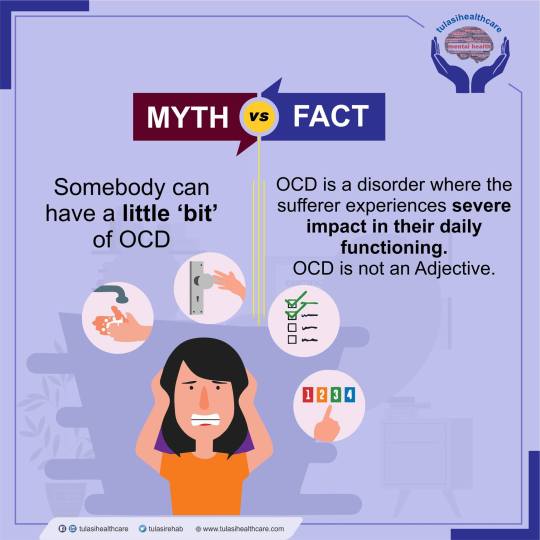
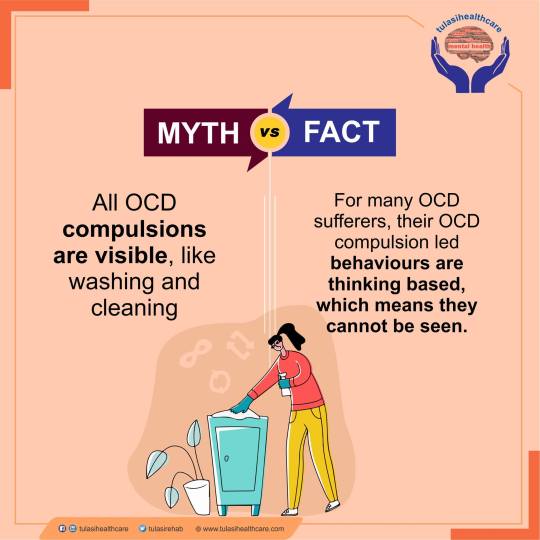
There are a lot of myths around Obsessive-compulsive disorder and what the sufferers are really going through. Some myths and facts about OCD.
Connect with our healthcare professional to know more.
Call us at +91-8800000255
psychiatrist in gurgaon
#OCD#disorder#obsessivecompulsivedisorder#ocdawareness#chronicanxiety#ocdfighter#bravery#identity#anxiety#anxietyrelief#anxietysupport#anxietyremedie#gethelp#Healing#takehelp#YouAreNotAlone#Mentalhealth#tulasihealthcare#myth#facts#instafacts
0 notes
Photo
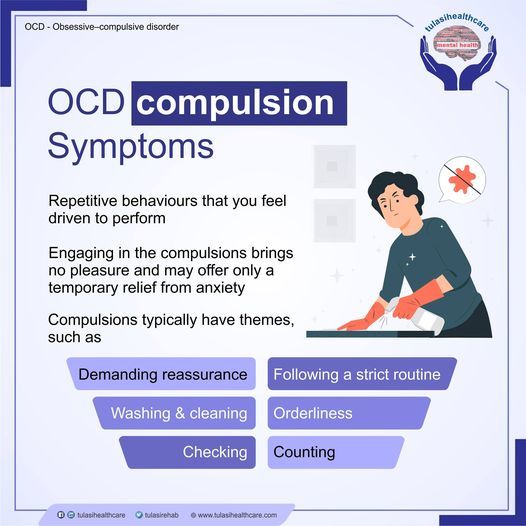
Obsessive-compulsive disorder usually includes both obsessions and compulsions. Here are some of the Compulsion Symptoms. Instead of ignoring or trying to force stop your compulsions, seek professional help.
Connect with our healthcare professional to know more.
Call us at +91-8800000255
psychiatrist in gurgaon
psychiatry hospital in gurgaon
#OCD#disorder#obsessivecompulsivedisorder#ocdawareness#chronicanxiety#ocdfighter#bravery#identity#anxiety#anxietyrelief#anxietysupport#anxietyremedie#gethelp#Healing#takehelp#YouAreNotAlone#Mentalhealth#tulasihealthcare
0 notes
Photo
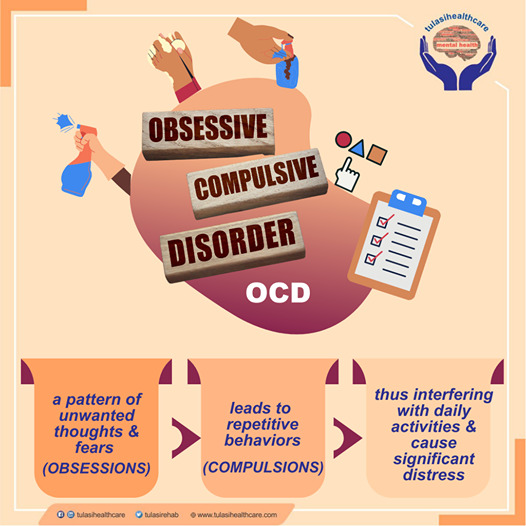
Obsessive-compulsive disorder (OCD) features a pattern of unwanted thoughts and fears (obsessions) that lead you to do repetitive behaviors (compulsions). Instead of ignoring or trying to force stop your obsessions, seek professional help.
Connect with our healthcare professional to know more. Call us at +91-8800000255
psychiatrist in gurgaon
#OCD#disorder#obsessivecompulsivedisorder#ocdawareness#chronicanxiety#bravery#identity#anxiety#anxietysupport#anxietyremedie#gethelp#Healing#takehelp#YouAreNotAlone#Mentalhealth#TulasiHealthcare
0 notes
Photo
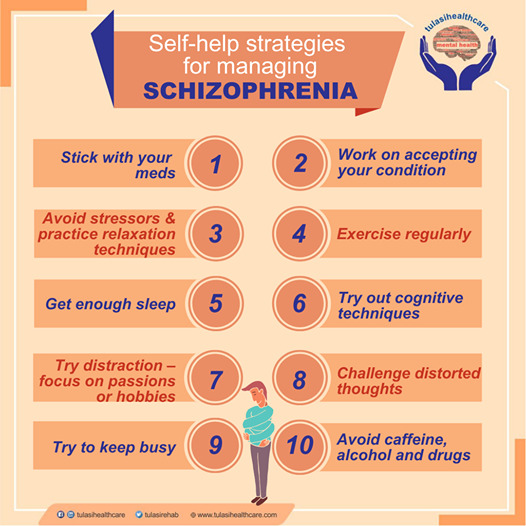
When it comes to managing Schizophrenia, it’s really important to develop coping strategies for use in everyday life, in addition to seeking professional help. Here are a few ways.
Connect with our healthcare professional to know more.
Call us at +91-8800000255
Psychiatric Hospital in Gurugram
#Schizophrenia#disorder#schizophreniaawareness#schizophreniaeducation#schizophreniatreatment#schizophreniamanagement#schizophreniacopingtips#copingwithschizophrenia#managingschizophrenia#gethelp#Healing#takehelp#YouAreNotAlone#Mentalhealth#TulasiHealthcare
10 notes
·
View notes
Video
Treatment for Schizophrenia
Proper diagnosis & treatment can help people with Schizophrenia to lead healthy and productive lives.
Connect with our healthcare professional to know more.
Call us at +91-8800000255
psychiatric hospital in gurugram
#Schizophrenia#disorder#schizophreniaawareness#schizophreniaeducation#schizophreniatreatment#schizophreniamanagement#schizophreniacopingtips#copingwithschizophrenia#managingschizophrenia#gethelp#Healing#takehelp#YouAreNotAlone#Mentalhealth#TulasiHealthcare
0 notes
Photo
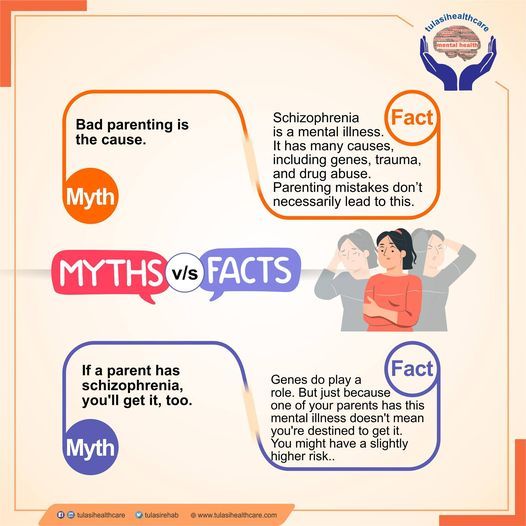
Dispelling some of the common myths about schizophrenia.
Connect with our healthcare professional to know more.
Call us at +91-8800000255
psychiatric hospital in gurugram
#Schizophrenia#disorder#schizophreniaawareness#schizophreniaeducation#schizophreniatreatment#schizophreniamanagement#schizophreniacopingtips#copingwithschizophrenia#managingschizophrenia#gethelp#Healing#takehelp#YouAreNotAlone#Mentalhealth#TulasiHealthcare
0 notes
Photo
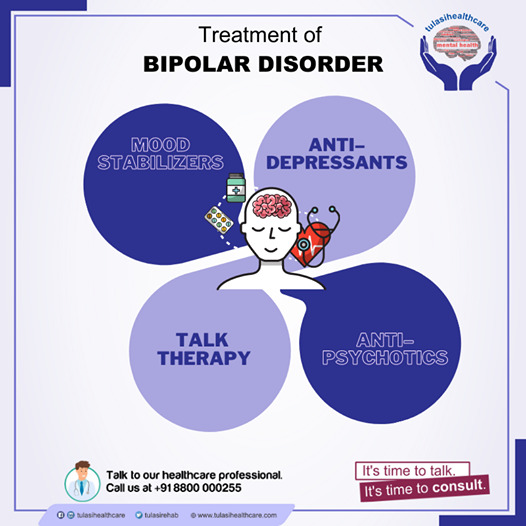
Dispelling some of the common myths about schizophrenia.
Connect with our healthcare professional to know more.
Call us at +91-8800000255
psychiatric hospital in gurugram
#Schizophrenia#disorder#schizophreniaawareness#schizophreniaeducation#schizophreniatreatment#schizophreniamanagement#schizophreniacopingtips#copingwithschizophrenia#managingschizophrenia#gethelp#Healing#takehelp#YouAreNotAlone#Mentalhealth#TulasiHealthcare
0 notes
Photo
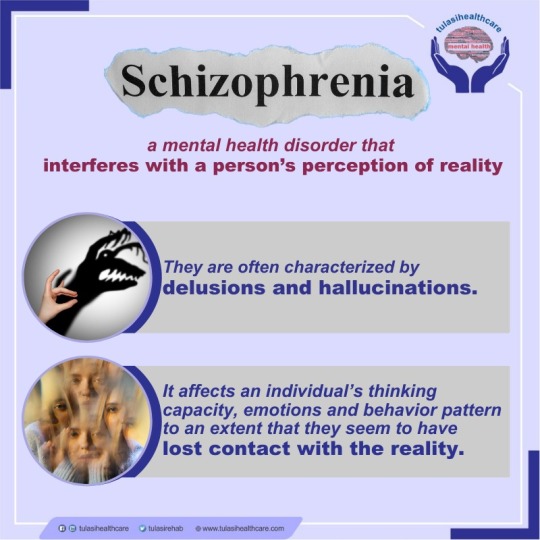
Schizophrenia is a disorder that affects a person's ability to think, feel and behave clearly. Connect with our healthcare professional to know more. Call us at +91-8800000255
#Schizophrenia#disorder#schizophreniamanagement#schizophreniaawareness#schizophreniaeducation#schizophreniatreatment#schizophreniacopingtips#copingwithschizophrenia#managingschizophrenia#gethelp#Healing#takehelp#YouAreNotAlone#Mentalhealth#TulasiHealthcare
2 notes
·
View notes
Photo
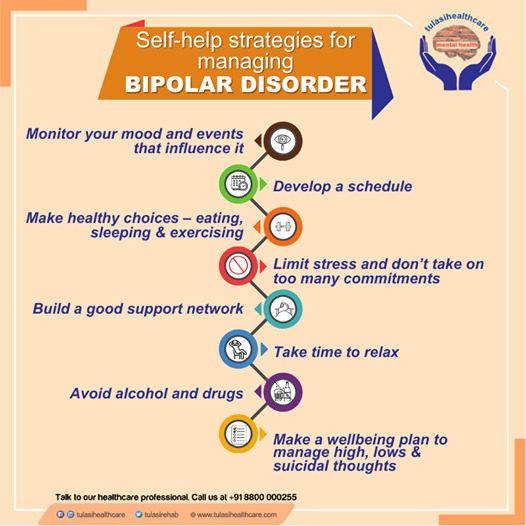
When it comes to managing bipolar disorder, it’s really important to develop coping strategies for use in everyday life, in addition to seeking professional help.Here are a few ways. Connect with our healthcare professional to know more. Call us at +91-8800000255
#Bipolar#disorder#twopoles#depression#mania#gethelp#Healing#takehelp#YouAreNotAlone#Mentalhealth#mood#TulasiHealthcare
4 notes
·
View notes
Photo
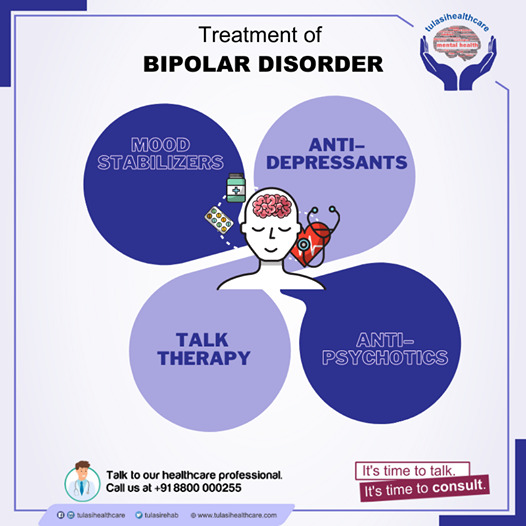
Proper diagnosis & treatment can help people with bipolar disorder to lead healthy and productive lives. Connect with our healthcare professional to know more. Call us at +91-8800000255
Psychiatric Hospital in Gurgaon
#Bipolar#disorder#twopoles#depression#mania#gethelp#Healing#takehelp#YouAreNotAlone#Mentalhealth#mood#TulasiHealthcare
1 note
·
View note